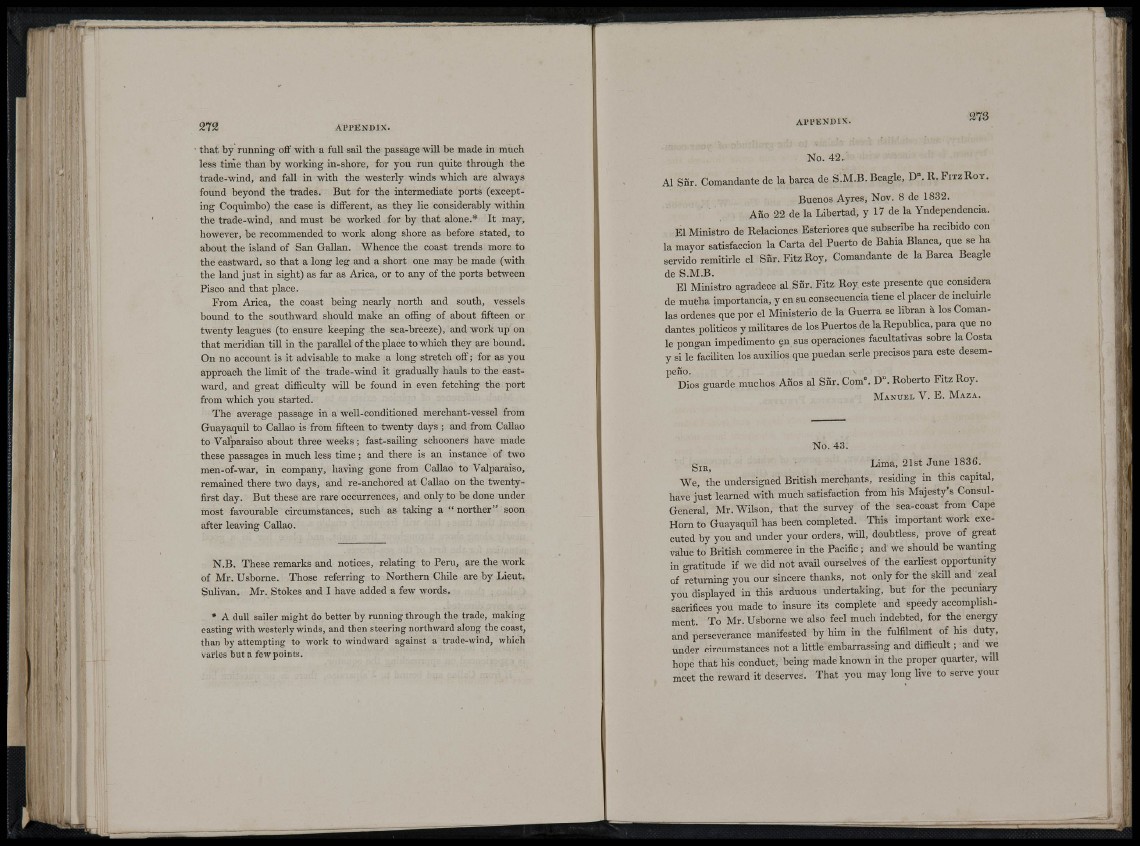
t ' 'I
272 Al'I'KNBlX.
• tha t by running off with a full sail the passage will be made in much
less time than by working in-ahore, for you run quite through the
trade-wind, and fall in with the westerly -ninds which are always
found beyond the trades. But for the intermediate ports (excepting
Coquimbo) the case is different, as they lie considerably within
the trade-wind, and must be worked for by that alone.* It may,
however, be recommended to work along shore as before stated, to
about the island of San GaUan. Whence the coast trends more to
the eastward, so that a long leg and a short one may be made (with
the land just in sight) as far as Arica, or to any of the ports between
Pisco and that place.
From Arica, the coast being nearly north and south, vessels
bound to the southward should make an oiling of about fifteen or
twenty leagues (to ensure keeping the sea-breeze), and work up on
that meridian till in the parallel of the place to which they are bound.
On no account is it advisable to malie a long stretch off; for as you
approach the limit of the trade-wind it gradually hauls to the eastward,
and great difficulty will be found in even fetching the port
from which you started.
The average passage in a well-conditioned merchant-vessel from
Guayaqtul to CaJlao is fi'om fifteen to twenty days ; and from Callao
to Valparaiso about three weeks; fast-sailing schooners have made
these passages in much less t ime; and there is an instance of two
men-of-war, in company, having gone from Callao to Valparaiso,
remained there two days, and re-anchored at Callao on the twentyfirst
day. But these are rare occurrences, and only to be done under
most favourable circumstances, such as taking a " norther" soon
after leaving Callao.
N.B. These remarks and notices, relating to Peru, are the work
of Mr. Usbome. Those referring to Northern Chile are by Lieut.
Sulivan. Mr. Stokes and I have added a few words.
• A dull sailer might do better by running through the trade, making
easting with westerly winds, and then steering northward along the coast,
than by attempting to work to windward against a trade-wind, which
varies but a few points.
Al'l'liNDlX.
No. 42.
Al Sñr. Comandante de la barca de S.M.B. Beagle, D°. R. FITZROY.
Buenos Ayres, Nov. 8 de 1832.
Año 22 de la Libertad, y 17 de la Yndependcncia.
El Ministro de Relaciones Esteriores que subscribe ha recibido con
la mayor satisfacción la Carta del Puerto de Bahia Bianca, que se ha
servido remitirle el Sñr. Fi tzRoy, Comandante de la Barca Beagle
de S.M.B.
El Ministro agradece al Sñr. Fitz Roy este presente que considera
de mucha importancia, y en su consecuencia tiene el placer de mclmrle
las ordenes que por el Ministerio de la Guerra se libran à los Comandantes
poUticos y militares de los Puertos de la República, para que no
le pongan impedimento en sus operaciones facultativas sobre la Costa
y si le facibten los auxilios que puedan serle precisos par a este desempeño.
.
Dios guarde muchos Años al Sñr. Com°. D". Roberto Fitz Roy.
MANUEL V . B. MAZA.
i
No. 43.
gjj^ Lima, 21st June 1836.
We, the undersigned British merchants, residing in this capital,
have just learned with much satisfaction from his Majesty' s Consul-
General, Mr. WUson, that the survey of the sea-coast from Cape
Horn to'Guayaquil has been completed. This important work executed
by you and under your orders, ^vül, doubtless, prove of great
value to British commerce in the Pacific; and we should be wanting
in gratitude if we did not avail ourselves of the earUest opportunity
of returning you our sincere thanks, not only for the skffl and zeal
you displayed in this arduous undertaldng, but for the pecuniary
sacrifices you made to insure its complete and speedy accomplishment.
To Mr. Usborne we also feel much indebted, for the energy
and perseverance manifested by him in the fulfilment of his duty,
under cncumstances not a little embai-rassing and difficult; and we
hope that his conduct, being made known in the proper quarter, will
meet the reward it deserves. That you may long live to serve your